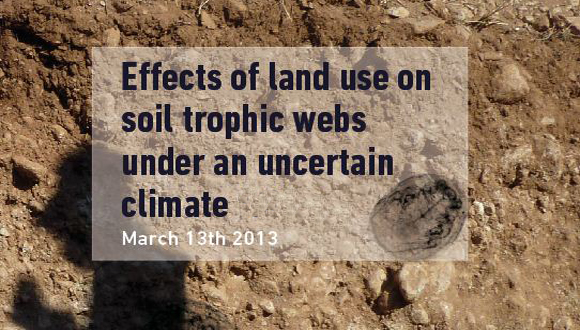Soil biodiversity functions and environmental services in Mediterranean forests
In this seminar, CREAF propose an introduction to soil biodiversity functions in the arid and semi-arid Mediterranean area, with special emphasis on effects of land use and climate change.

Soil is one of the most complex ecosystems on earth, and provides a range of environmental services that ultimately sustain life on the planet, including soil formation, nutrient cycling and plant production, water cycle regulation and climate regulation.
A great part of these services are due to the activity of the soil biota that is characterized by overwhelming abundance and biodiversity. Over one-quarter of all living species on planet Earth live in the soil, and a handful of soil harbors thousand of prokaryotic and eukaryotic species, most of which have not yet been described. Soil bacterial biomass is impressive (up to 1-2 ton per hectare in grasslands) and so is bacterial biodiversity, with about 10,000 different bacterial genomes in one gram of soil.
In this seminar, we propose an introduction to soil biodiversity functions in the arid and semi-arid Mediterranean area, with special emphasis on effects of land use and climate change.
From a trophic point of view, soil biota is organized in food webs. Soil organisms at the bottom of the webs get the energy they need by eating living plants or by decomposing organic wastes, while organisms belonging to intermediate and upper levels of the web consume each other. Throughout this process, nutrients are converted to inorganic forms available to plants, and carbon is transformed in stable forms that will remain in soil or is respired and released into the atmosphere as CO2.
Climatic scenarios for the Mediterranean area for the coming decades predict increased warming and decreased total annual rainfall, which threaten to alter soil biodiversity. Since about 80% of the global terrestrial carbon pool is located in soils, and since half of the CO2 evolved from soils is due to soil biota respiration, changes in the composition, abundance and activity of the soil living community could significantly increase or mitigate CO2 terrestrial emissions and modify soil fertility.
SEMINAR PROGRAMME
9.30h Welcome and Introduction
Pilar Andrés, CREAF, Spain
10.00h Towards relevant indicators of soil biodiversity and soil biodiversity ecological services in European soils
Joao Paulo Sousa, Instituto do Ambiente e Vida. Universidade de Coimbra, Portugal
10:30h Effects of tree species and management on the diversity and functioning of soil microbial trophic webs involved in the maintenance of soil fertility in forest ecosystems
Xavier Le Roux, Microbial Ecology Laboratory, INRA-Université de Lyon, France
11:00h Studies on the community structure of arbuscular mycorrhizal fungi associated to characteristic woody plant species in Mediterranean environments
Concha Azcón-Aguilar, José Miguel Barea, A. López-García, S. Varela. Department of Soil Microbiology and Symbiotic Systems. Zaidín Experimental Station, CSIC, Spain
11:30h Coffee Break
12:00h Attributing new functions and roles to soil organisms - an environmental genomics perspective
Roland Marmeisse, Microbial Ecology Laboratory, INRA-CNRS-Université de Lyon, France
12:30 Spatio-temporal dynamics of soil food webs and above-belowground interactions in a Mediterranean arid ecosystem
Enrique Doblas, Francisco Sánchez Piñero, CREAF / Animal Biology and Ecology Department, University of Granada, Spain
13:00 Soil food webs, land use change and climate. Nematode community indicators Stefanos Sgardelis, Department of Ecology, Aristotle University of Thessaloniki, Greece
13:30 Discussion and Summary
ORGANIZATION
CREAF
COLLABORATORS
Universitat Autònoma de Barcelona (UAB)
This seminar has been founded by ARCS
LOCATION
Universitat Autònoma de Barcelona.
Campus de Bellaterra
Edifici C, Facultat de Ciències
Sala d’actes de la Facultat de Ciències
REGISTRATION
Registration is free but, please, confirm you attendance at pilar.andres@uab.cat






